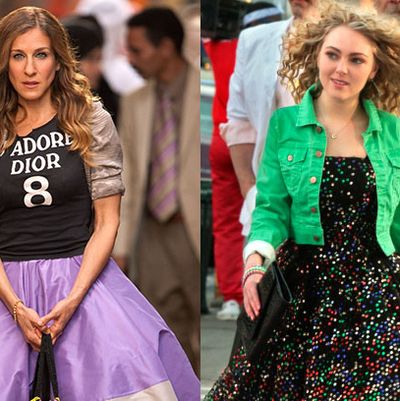
The Carrie Diaries (premiering Monday on the CW) tells Carrie BradshawÔÇÖs coming-of-age story ÔÇö a story we got very, very little of from Sex and the City. Yes, we know she dated a guy named Jeremy in high school and that she had an abortion in 1988 ÔÇö but as for cold, hard, biographical facts, we didnÔÇÖt learn much from the show. Except for this, from the seventeenth episode of the fourth season:
The backstory: CarrieÔÇÖs dad ÔÇ£quitÔÇØ her and her mother when she was 5. (We probably didnÔÇÖt need to hear Ron Rifkin give a speech on daddy issues, but this was a backstory we could get behind.)
Now watch this Carrie Diaries trailer:
The backstory: CarrieÔÇÖs mom died just before CarrieÔÇÖs junior year of high school. Her dad is a very present, Danny Tanner type (minus, so far, the vacuum).
Does the discrepancy matter? If you bought into RifkinÔÇÖs Abandonment Issues 101 speech, it probably does. But letÔÇÖs assume a girl can have a strong male figure in her life and still grow up to be a sex columnist who falls for men like Big. Even then, thereÔÇÖs something about the Diaries world that doesnÔÇÖt parallel the world that Sex and the City had us imagine: The new show sets CarrieÔÇÖs adolescence in upper-crust Connecticut, in a town whose very name, Castlebury, suggests itÔÇÖs fit for a princess. Her dad wears fancy suits and gets her a sophisticated law-firm internship. Her mom left behind a closetful of fancy clothes and racks of whatever the eighties equivalent of Manolos were (not Keds).┬áSATC, on the other hand, gave you glimpses of a Carrie whose roots seemed much more working-class.
CarrieÔÇÖs SATC lifestyle was extravagant and unrealistic, but she never seemed entitled to it, nor particularly on top of it, financially. She was in credit card debt. She rented her apartment for much of the series, then bought it ÔÇö out of breakup desperation ÔÇö with help from Charlotte, whom she at one point resented for having so much money. She didnÔÇÖt own an espresso machine until the Russian bought her one. She didnÔÇÖt travel to Paris until she was in her late thirties*, despite the fact that she always wanted to go. And then when she finally did go, she felt totally out of place. She couldnÔÇÖt even speak French (Rich PeopleÔÇÖs No. 1 Second Language).┬á
Perhaps more telling of CarrieÔÇÖs class status than her finances, though, was the fact that no matter what level of ÔÇ£ItÔÇØ girl status she achieved, she always seemed to feel like an outsider. In the clip from the original show above, she was meeting with RifkinÔÇÖs character because she couldnÔÇÖt find her footing at Vogue. She was scared to even walk through their offices. When she found out Big and Natasha got married, her response was pretty self-loathing: ÔÇ£SheÔÇÖs shiny-hair style section Vera Wang, and IÔÇÖm the sex column they run next to ads for penile implants.ÔÇØ And watching her explain the RussianÔÇÖs fancy-pants light installations to her more down-to-earth, kindred-spirit friends was painful. Maybe it was Sarah Jessica ParkerÔÇÖs own modest background peeking through, but CarrieÔÇÖs privilege didnÔÇÖt seem to run deep.
ItÔÇÖs not as if the new-past Carrie is very rich or very spoiled. SheÔÇÖs clearly been dealt a parental bad hand, and she seems fun and warm and sweet, just as HBO would have her grow up to be. But sheÔÇÖs not from as scrappy a background as SJPÔÇÖs Carrie. Had her version of growing-up-Bradshaw been part of SATCÔÇÖs fabric, the series would have been intolerable (nobody wants to watch a show about a writer who is self-absorbed and spending family money). And Carrie totally would have married Aidan. Boring!
*A previous version of this post said Carrie was in her mid-forties when she first went to Paris. So wrong.

